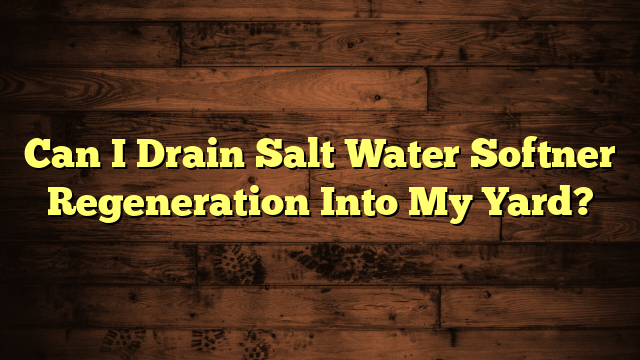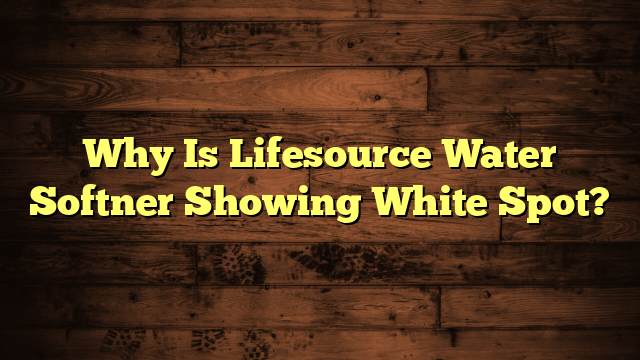Can I Drain Salt Water Softner Regeneration Into My Yard?
You might be wondering if draining the regeneration brine from your salt water softener into your yard is a viable option. While it may seem convenient, the high salinity in the brine can seriously harm your soil and plants, disrupting nutrient uptake and damaging beneficial microorganisms. It's essential to contemplate the long-term effects on your landscape. What are your alternatives for disposing of this brine safely? Exploring the best practices could save you from unexpected consequences in your yard.
Key Takeaways
- Draining salt water softener regeneration into your yard can increase soil salinity, harming plant life and disrupting local ecosystems.
- Local regulations often prohibit discharging brine into yards; consult local water authorities for specific disposal rules.
- High salt concentrations can lead to plant stress, wilting, and nutrient deficiencies due to disrupted soil health.
- Consider alternative disposal methods, like connecting to wastewater treatment facilities or recycling for non-potable uses.
- Regular soil testing can help monitor salinity levels and maintain healthy yard conditions while ensuring compliance with environmental guidelines.
Understanding Salt Water Softeners
When it comes to water treatment, understanding salt water softeners is essential for maintaining your home's plumbing and improving water quality.
These systems work by removing minerals like calcium and magnesium from your water, which can cause hard water issues. Through a process called ion exchange, salt is used to replace these hard minerals, effectively softening your water.
You might be wondering about the role of salt alternatives in this process. While traditional salt is effective, there are various salt alternatives available that can still achieve water softening.
These alternatives often use potassium chloride, which can be gentler on your plumbing and the environment. Switching to salt alternatives can also help reduce your sodium intake if you're concerned about health issues related to high sodium levels.
When you decide to invest in a salt water softener, remember that it's an investment in your home's longevity and your family's health.
Ensuring that you maintain your system properly will keep your water quality high and your plumbing in good shape. In the long run, understanding these aspects can save you both time and money.
The Regeneration Process Explained
The regeneration process is a key operation in ensuring your salt water softener continues to function effectively. During this process, the system undergoes a regeneration cycle, where it cleans and recharges the resin beads that remove hardness minerals from your water. This cycle typically occurs every few days, depending on your water usage and system settings.
First, the softener flushes the resin with a brine solution, which is a highly concentrated saltwater mixture. This solution flows through the resin tank, displacing the hardness minerals that have built up over time. As the brine solution passes through the resin, it replaces the calcium and magnesium ions with sodium ions, effectively recharging the resin.
After the softener uses the brine solution, it rinses the resin with fresh water to eliminate any leftover salt. This final rinse prepares the system for the next cycle of softening your water.
Understanding this regeneration process is critical, as it impacts the efficiency and lifespan of your salt water softener, ensuring you maintain soft, high-quality water for your household.
Environmental Impact of Saltwater
While saltwater softeners effectively improve water quality, their environmental impact shouldn't be overlooked. When these systems regenerate, they often discharge high-salinity water, which can harm the surrounding environment.
If you drain this saltwater into your yard, you risk contaminating local soil and groundwater, affecting plant life and potentially disrupting saltwater ecosystems.
Salt from regeneration can lead to increased salinity in the soil, which makes it difficult for many plants to thrive. Some species may die off entirely, disrupting the local ecosystem.
Additionally, the high salt concentration can affect the microbial life essential for maintaining soil health.
In many areas, environmental regulations exist to manage how saltwater waste is handled. These regulations aim to protect public health and preserve the delicate balance of local ecosystems.
Ignoring these guidelines could lead to fines and further environmental degradation.
Local Regulations and Guidelines
Understanding local regulations and guidelines is vital for anyone using a saltwater softener. These rules can vary considerably from one area to another, so it's essential to get familiar with your specific local laws. Many communities have established guidelines regarding the disposal of brine, the byproduct of softener regeneration. Ignoring these regulations can lead to fines or environmental issues.
Here's a quick reference table to help you navigate some common local guidelines:
| Regulation | Details | Consequences |
|---|---|---|
| Discharge into storm drains | Often prohibited | Potential fines |
| Directly into soil | Usually regulated | Environmental harm |
| Use of alternative systems | May be encouraged | Can improve water quality |
Check with your local water authority or municipality to find out the specific rules that apply to your area. Following community guidelines not only keeps you compliant but also protects the environment. Plus, it guarantees that you're contributing positively to your neighborhood. Always err on the side of caution; when in doubt, don't hesitate to ask for clarification.
Effects on Yard and Plants
When you drain the salt water from your softener, it can greatly affect your yard and plants.
The high salt concentration may harm sensitive vegetation, leading to wilting or even death if not managed properly.
Furthermore, the soil's health can decline over time, impacting its ability to support healthy growth.
Salt Concentration Impact
High salt concentration from water softener regeneration can have detrimental effects on your yard and plants. When you drain this brine solution into your yard, you're introducing high levels of sodium into the soil. This increased soil salinity can lead to salt toxicity, which can harm your plants.
Excessive salt in the soil affects water uptake, making it challenging for plants to absorb water and nutrients. Plants often exhibit signs of stress, such as wilting, leaf burn, and stunted growth. Furthermore, some species may be unable to tolerate the elevated salinity, leading to die-off in more sensitive plants.
The impact isn't just limited to the immediate area; salt can leach deeper into the soil, affecting the entire ecosystem and even contaminating groundwater sources.
Therefore, it's crucial to evaluate alternative disposal methods for your water softener's brine solution. You might want to explore options like draining it into a suitable sewer system or a designated disposal area, ensuring minimal disruption to your yard's health and well-being.
Plant Sensitivity Levels
Not all plants react the same way to increased salt levels in the soil, and their sensitivity can vary greatly. When considering draining salt water softener regeneration into your yard, it's crucial to understand how different plant types can be affected.
Some plants have high salt tolerance, meaning they can thrive even in salty conditions, while others may struggle or even die off. For instance, succulents and certain grasses tend to tolerate salt better than delicate flowering plants like ferns or azaleas.
If you have a garden with a mix of these plants, you might notice that some flourish while others show signs of stress, such as wilting or leaf burn. Additionally, salt-sensitive plants may exhibit reduced growth rates and poor overall health when exposed to elevated salt levels.
If you're committed to maintaining a diverse garden, consider grouping salt-tolerant plants together, away from those that are more sensitive. This way, you can minimize the risk of damage while still enjoying the benefits of your softener system.
Always observe your plants closely, as their responses can provide crucial clues about their salt tolerance and overall well-being.
Soil Health Effects
Draining salt water softener regeneration can greatly impact soil health, influencing both the yard and plants growing in it. When you introduce high salt concentrations into your soil, it can alter the soil composition and disrupt the nutrient balance essential for healthy plant growth.
Here are some potential effects you might encounter:
- Soil Structure: Excessive salt can lead to soil compaction, reducing aeration and drainage.
- Nutrient Uptake: High salinity can hinder plants' ability to absorb essential nutrients, leading to deficiencies.
- Water Retention: Salt can affect the soil's ability to retain moisture, which is crucial for plant health.
- Plant Stress: Salinity can stress plants, causing wilting, yellowing leaves, or even death in sensitive species.
- Microbial Activity: Beneficial soil microbes may decrease, disrupting natural processes like decomposition.
To maintain a vibrant yard, consider alternative disposal methods for your salt water softener regeneration.
Regularly testing your soil can help you understand its composition and nutrient balance, allowing you to make informed decisions that promote a healthy, thriving landscape.
Always prioritize the well-being of your plants and soil!
Alternatives for Disposal
When considering disposal methods for the brine produced during a salt water softener's regeneration process, you've got several alternatives to explore.
One effective option is to connect with your local wastewater treatment facility. They often have guidelines for safely disposing of brine, making sure it's handled properly without harming the environment.
Another alternative is to use a dedicated brine disposal service. These companies specialize in managing saltwater waste and can take care of the brine for you, providing peace of mind.
You might also consider recycling the saltwater for non-potable uses, like irrigation for salt-tolerant plants, but be sure to check local regulations first.
If you're looking for yard alternatives, make certain that you don't drain the brine directly onto your lawn or garden.
Instead, think about creating a collection system that channels the brine to a designated area, away from sensitive plants.
You could even explore using a holding tank, which allows you to manage the brine until a suitable disposal method is available.
Best Practices for Maintenance
Regular maintenance is vital for keeping your salt water softener functioning efficiently.
By performing routine checks and following some straightforward maintenance tips, you can extend the life of your system and guarantee it operates at its best.
Consider these best practices for maintenance:
- Check salt levels: Regularly inspect the salt levels in your brine tank and refill as needed to prevent issues.
- Clean the brine tank: Periodically clean the brine tank to remove any sediment or buildup that can affect performance.
- Inspect the resin: Look for the resin beads in your softener; they should be clear and functional. If they're discolored or damaged, it may be time for a replacement.
- Examine the valve: Check the control valve for any leaks or malfunctions. This component is essential for the regeneration process.
- Schedule professional servicing: While you can handle many tasks yourself, having a professional service your system annually can catch issues before they become problems.
Consulting With Professionals
Sometimes, it's easy to overlook the importance of consulting with professionals for your salt water softener. When it comes to managing the regeneration process, expert opinions can be invaluable. You might think draining the regeneration waste into your yard is harmless, but the implications can be more complex than you realize.
A professional consultation can help clarify local regulations and environmental impacts, ensuring you make informed decisions. Experts can assess your specific situation and provide tailored advice. They'll look at factors like soil type, existing vegetation, and local water systems to determine the best course of action.
By involving professionals, you can avoid potential pitfalls, such as damaging your lawn or violating local ordinances. Additionally, professionals may recommend alternative disposal methods that align with best practices. This proactive approach can save you time, money, and headaches down the road.
In the end, consulting with experts isn't just about compliance; it's about the health of your yard and the surrounding ecosystem. So, don't hesitate to reach out for professional guidance—your plants (and your conscience) will thank you!
Frequently Asked Questions
Can I Use Saltwater for Watering My Garden Plants?
You shouldn't use saltwater for watering your garden plants. Saltwater toxicity can harm your plants, causing stress and stunted growth. Most garden plants are sensitive to salt, so it's best to avoid it altogether.
What Are the Long-Term Effects of Saltwater on Soil Health?
Imagine a garden drowning in an ocean of salt. Over time, soil salinity rises, suffocating microbial activity. Your plants struggle to thrive, and the delicate balance of life beneath the surface teeters on the brink of disaster.
How Often Do Water Softeners Regenerate?
Water softeners typically regenerate every 3 to 7 days, depending on your water softener frequency and usage. During the regeneration process, they flush out minerals, ensuring you continue enjoying soft water without issues.
Can I Mix Saltwater With Other Garden Treatments?
You shouldn't mix saltwater with other garden treatments. Saltwater toxicity can harm your garden soil and plants, inhibiting growth and altering nutrient absorption. It's best to keep them separate for a healthy garden environment.
Will Saltwater Affect My Lawn's Drainage System?
Saltwater can harm your lawn's drainage system, causing salt toxicity that negatively impacts lawn health. It can lead to poor growth, and you'll notice signs of stress in your grass if exposed frequently.
Conclusion
To sum up, draining salt water softener regeneration into your yard can seriously harm your soil and plants. Why risk your garden's health when there are better options? By exploring local disposal services or connecting with wastewater facilities, you can protect your yard and the environment. Remember, taking the right steps not only keeps your plants thriving but also promotes a healthier ecosystem. So, make informed choices for your home and the planet!







